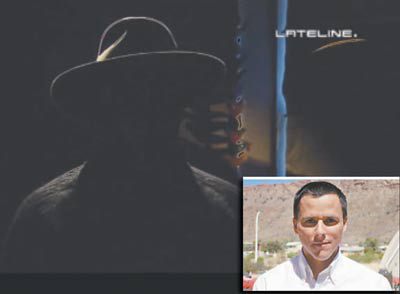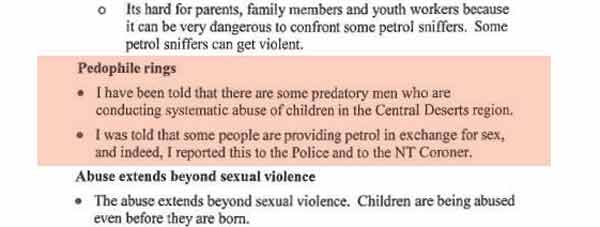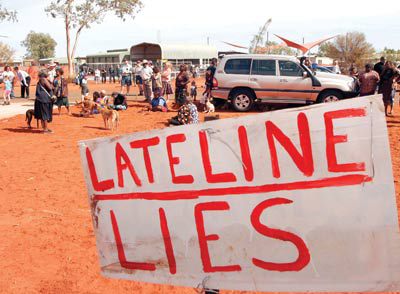There’s a simple reason why, for the last few years, I’ve never owned a television. I get too angry, and I start yelling at it.
Reality television – which is ironically always devoid of reality – is usually the culprit, although news and current affairs works me into the deepest of frenzies.
My partner Ange and I finally bought a television at Christmas. Turns out I still yell at it. And turns out I should still avoid news and current affairs.
In case you missed ABC’s Q&A you can watch it here. The show featured prominent elders Jane Goodall (Primatologist); Betty Churcher (Art educator); Peter Coleman (Conservative intellectual); Stuart Rees, Founder of the Sydney Peace Foundation; and last but definitely not least, Arrente-Alyawarra elder Rosalie Kunoth-Monks.
I’ve known Rosie for a few years. She was one of the stars of Utopia, the John Pilger documentary on which I served as Associate Producer.
There are few Aboriginal women in this country I respect more than Rosie. She is a deep thinker and a stunning orator, the antidote to other eloquent blackfellas like Noel Pearson, who are frequently – and wrongly – put up by mainstream media as the authentic voices of Aboriginal Australia.
So I was particularly pleased when a question came from the audience about the apparent whiteness of Australia, despite the strong multicultural mix of our nation.
Jones threw to Kunoth-Monks for a response.
“I’ve lived for over 70 years under a regime and a system that not only destroys my culture, but also me as a person,” Kunoth-Monks told the audience.
“We do live under trauma. Just look back to 2007. One of the most horrific controls was put on us with absolute lies.”
Kunoth-Monks, of course, is referring to the Northern Territory intervention, a Howard government policy enacted with the comfort of the Labor party through the suspension of the Racial Discrimination Act.
What Kunoth-Monks said next was truly staggering, but only if you know the back story.
“We were all pedophiles. Look at Mutitjulu. That was a lie. Absolute lie,” she said.
Indeed it was. But what was so stunning about it was that sitting right next to Kunoth-Monks was one of the chief perpetrators – and subsequent defenders – of that “lie”.
For the uninitiated, Tony Jones was once the full-time host of ABC Lateline, a late night ABC current affairs program that broadcast the story Kunoth-Monks is specifically referring to.
That story was aired on June 21, 2006, and entitled ‘Sexual slavery reported in Indigenous community’. It alleged that senior men in Mutitjulu had created an environment where children were being held as “sex slaves”, and where an elderly man was able to prey on children with impunity, courtesy of his family connections.
Jones was not the journalist who constructed the story. That honour belongs to Walkley Award winning reporter Suzanne Smith. But Jones was the presenter of it, one of the interviewers in it, and, later, its chief defender.
Yet last night, when Kunoth-Monks attacked it, Jones didn’t bat an eyelid. He didn’t skip a beat. He didn’t even blush.
Instead, he declared no interest, then asked Kunoth-Monks if she was suggesting things had not improved.
“Are you saying that you don’t feel anything much has changed, because the country has changed an awful lot since you were a young woman…?” asked Jones.
Nicely deflected Tony, because as you well know, what Kunoth-Monks was actually suggesting was that she has been living with the consequences of that “lie” ever since.
You can read Jones’ response to the original allegations around the story in Crikey here.
You can read, in detail, why Kunoth-Monks described the allegations against Mutitjulu as a “lie” here.
But if you want a brief-ish précis, read on.
One of the major problems with Lateline’s reporting was the description of a senior government official that featured in the story as an ‘anonymous former youth worker’.
That official was Gregory Andrews, an Assistant Secretary in the Office of Indigenous Policy Coordination and the man who was advising then Minister for Aboriginal Affairs, Mal Brough specifically on violence in Central Australian communities.

Andrews, despite Lateline’s claim, had never had a job as a ‘youth worker’. But his deliberately false description was by no means the biggest fraud.
Prior to his Lateline interview, Andrews prepared some speaking notes, which he provided to Minister Mal Brough’s office. Those notes reveal that once Andrews was afforded anonymity by Lateline, he grossly embellished his story, a fact which Lateline and the ABC have patently refused to ever acknowledge.
For example, Andrews warned the Minister’s office that he was going to tell Lateline: “I saw women (in Mutitjulu) coming to meetings with broken arms.”
Instead, with his face filmed in shadow and his voice digitized, Andrews told Lateline: “I saw women coming to meetings with broken arms… and with screwdrivers or other implements through their legs.”
He told the Minister’s office he would say: “I have been told that there are some predatory men who are conducting systematic abuse of children in the Central Deserts region.”
Nothing wrong with that – undoubtedly there are men in the Central Deserts region who are doing precisely that, just as there are men in Sydney, Melbourne and everywhere else doing the same thing.
But on camera, Andrews told Lateline: “It’s true that there are predatory men in the central deserts who are systematically abusing young children. I’ve been told by a number of people of men in the region who go to other communities and get young girls and bring them back to their community and keep them there as sex slaves and… exchange sex for petrol with those young petrol sniffers.”

It’s this claim that formed the basis of the headline on the story, and the central themes of the program. It’s also this claim that was rejected by Northern Territory police, who conducted an extensive investigation. They interviewed more than 300 people and publicly announced there was “no evidence whatsoever” to support the claims aired by Lateline.
ABC Lateline subsequently refused to report the outcome of the police investigation.
The Australian Crime Commission also investigated these claims – with star chamber powers, no less – and also found no evidence. Again, Lateline refused to report the outcome of their investigation.
The decision to allow a senior government staffer on Lateline – and to hide his identity and falsely describe him – was an extraordinary one, particularly given Andrews’ history for stretching the truth.
Prior to appearing on Lateline, Andrews told a Senate Inquiry that he lived in Mutitjulu for nine months. He never lived there a single day.
He also told parliament that ‘children were hanging themselves from the church steeple on Sundays and their mothers were having to cut them down’. No child has ever hung themselves from the Mutitjulu church steeple. No mother has ever had to cut their child down.
Lateline was warned by at least two witnesses subsequently interviewed in the story against using Andrews. Lateline used him anyway.
But the biggest problem for Lateline was this one: the story gave substantial air-time to a doctor who was working in Mutitjulu, and who used the program to cover his own appalling secret.
Dr Geoff Stewart backed up the central themes in the story – that men had created the environment where women and children were being abused.
What Lateline didn’t tell you was that for several years, Dr Stewart had been prescribing Viagra to the elderly alleged paedophile at the centre of the story, including for seven months after Stewart wrote in the man’s health notes, ‘Is using Viagra to have sex with young females’.

What Lateline also didn’t tell you is that it had been leaked a report about the activities of doctors in Mutitjulu, but rather than reveal them, it cherry-picked the section which backed up its claim that it was Aboriginal men who created the problem.
You won’t have read or heard anything about this from the ABC. No station, no program – including Media Watch – no online story anywhere in the country ever reported any of the revelations around Dr Stewart, despite the story receiving strong mainstream media interest.
Lateline also neglected to tell you that despite producing a 25-minute story about Mutitjulu, it was all done from Alice Springs (500km to the north east) and Sydney. That’s right, at no time prior to the airing of their story did Lateline even set foot in Mutitjulu.
That would explain why the story was littered with old file footage, and shots of other communities, which were depicted as Mutitjulu.
And that, believe it or not, is the only concession the ABC has ever made. Beyond acknowledging it should not have used file footage and depicted it as somewhere else, the ABC has never admitted any fault. Instead, it has described the false description of Andrews as “unfortunate”, and stuck by all the other claims in the story.
I’d direct you to the ABC’s further defence of the program, but it has been removed from the Lateline website.
Of course, beyond the journalism itself, the real outrage should be directed at what flowed from it. But before we do, here’s a bit more of the back story.
Jones’ cool, calm reaction last night was in stark contrast to his reaction during a December 2011 episode of Q&A, in which Kunoth-Monks also starred, along with Dave Tollner, a conservative Northern Territory politician.
In response to a discussion about the NT intervention, Kunoth-Monks had suggested that the federal government needed to properly engage with Aboriginal people, “not hunt us like dogs”.
Jones invited a response from Tollner.
“Let’s put some things into context here Tony, and I do acknowledge your role in the intervention…” said Tollner.
A clearly pissed off Jones interrupted: “I had no role in the intervention, that was done by a government.”
“No, no, no, but it was your show that lifted the lid on many of the problems that occur in remote communities and I acknowledge that. That led to the major inquiry that resulted in the Little Children Are Sacred report, so I do acknowledge your interest in this area.”
I do too. I also acknowledge – and look forward to the day Jones does as well – what the NT intervention has actually done to Aboriginal people.

Today, school attendance in NT Aboriginal communities has dropped; alcohol related harm and violence against men, women and children has increased; the incarceration rate of Aboriginal people in NT prisons is at world record levels. No nation on earth incarcerates its Indigenous population at the rate Australia does. The NT is at least five times worse than Apartheid South Africa.
At the same time, several billion dollars of taxpayer funds have been blown on this policy, and yet, since its launch, the NT intervention has seen the self-harm and attempt suicide rates of Aboriginal people in the Northern Territory more than quadruple.
Imagine if a government policy delivered the same result in a white community? Imagine the outrage from the ABC, or from Tony Jones?
And I know from first hand experience the outrage felt by Rosie Kunoth-Monks, because I’ve sat in her country and talked to her about it.
I’ve talked to her about the suicides of two of her kin: a 15-year-old boy and a 10-year old boy.
I’ve listened to her despair at the emptying of her lands, the destruction of her people and their institutions.
And so the final word, appropriately, does belong to Rosie: here’s her response to a suggestion from fellow Q&A panelist Peter Coleman that Utopia – which helps to expose the lie of the NT intervention, and the Lateline program that led to it – is a “dreadful documentary”, and that assimilation for Aboriginal people is the only way forward.
“I have a culture. I am a cultured person (speaks in language). I am not something that fell out of the sky for the pleasure of somebody putting another culture into this cultured being.
“John [Pilger] chose (to depict) what is an ongoing denial of me. I am not an Aboriginal, or indeed Indigenous. I am an Arrente, Alyawarra First Nations person, a sovereign person from this country (speaks in language).
“I didn’t come from overseas. I came from here…. I am alive. I am here and now. And I speak my language. I practice my cultural essence of me.
“Don’t try and suppress me and don't call me a problem. I am not the problem. I have never left my country nor have I ceded any part of it.
“Nobody has entered into a treaty or talked to me about who I am.
“I am Arrente, Alyawarra female elder from this country.
“Please remember that. I am not the problem.”
And here's Rosie Kunoth-Monks' response to Jones’ question about whether or not things had improved for her people.
“Nothing at all…. It doesn’t matter if the government changes. A white Australian policy… is alive and well in Australia, and it usually experiments on blacks in the Northern Territory, because we are not a state.
“Come up and live with me some time. Live my life and I’ll show you."
Donate To New Matilda
New Matilda is a small, independent media outlet. We survive through reader contributions, and never losing a lawsuit. If you got something from this article, giving something back helps us to continue speaking truth to power. Every little bit counts.




